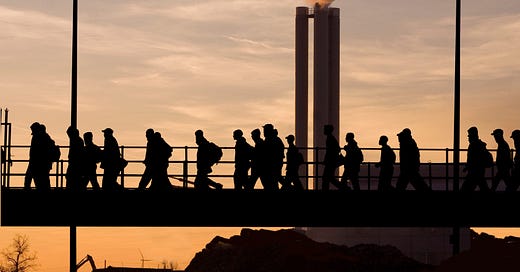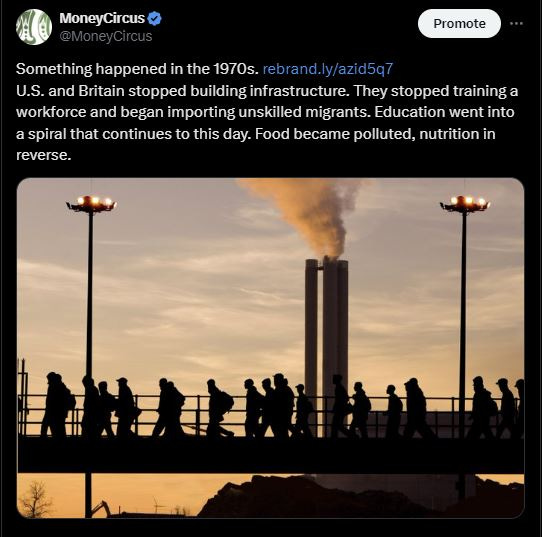Crisis Update: Rethinking Left & Right
Deindustrialisation and the worker's ruin - Kamala's price controls #2
Follow up to Kamala's Price Controls, accidental communist or globalist
Moneycircus doesn't take political shots but looks for the context and background
Ruination of the Western worker since 1975 makes such price controls topical
Salaries for 90 per cent of citizens would have been almost 70 per cent higher
But for the globalist transformations of society that began in the 1970s
The story ain’t ‘nice and clean like a washing machine’ - so get real
(1,900 words or nine minutes of your company.)
Aug 22, 2024
There was once the worker, sheafs of hay slung over shoulder or wrench in hand.
It was the labourer, moving from agricultural field to factory, who marched for an eight-hour work shift, while daily hired hands, often homeless, demanded full time jobs and membership of society.
Today's media cliché, “the soundtrack of your life,” was Beethoven's 6th, The Pastoral (1808), or Aaron Copeland's Fanfare For The Common Man (1942) — but did you know it was a paean to income tax?
Roads, sanitation and hospitals were built to support this new industrial workforce.
Workers went on holiday together during "factory fortnight." Plant or foundry, city or nation were a matter of rivalry and pride.
The wealthy were worried by the rising power of industrial human. Beginning in 1919 with the Palmer raids, the progressive president Woodrow Wilson had crushed their strikes and deported hundreds.
Yet despite the McCarthyite rhetoric of the Cold War, salaries continued to grow until the 1970s, when the unions were fully absorbed into the Democratic Party.
See A Wobbly Perspective - The Aesthetics of Resistance (Sep 03, 2021)
Then something happened. The U.S. and Britain stopped building infrastructure. They stopped training a workforce and began importing unskilled migrants. Education went into a spiral that continues to this day. Food became polluted, nutrition in reverse.
The 1970s was a pivotal decade. The transformation was, like the First World War, profoundly psychological.
The idea of the nation and the exotic, of home and abroad, was inverted. A world that had been one of exploration and quest was re-mapped upon itself, delimited, self-constrained and forbidden.
The worker who had expressed solidarity with the International Workers of the World was informed that he was a competitor.
Yet look closely and you’ll notice a strange reversal. First, the worker was communist, with a little c, a red during the Cold War. Nation was all.
Then the world turned upside down. China was our destiny. The Rockefeller-Nixon opening with China in 1972 was followed by the North American Free Trade Agreement in 1994 which began the steady export of jobs. Nation was expendable.
Individual agency was curtailed. The middle class administrator who was in trade or foreign service was told he needed a passport to travel. The exotic which had been a rite of passage became rare and eccentric.
The relationship between the managerial class and the countries they managed may have been colonial and yet it had been a close and mutual reliance.
Both socialism and capitalism are to blame — for each of them systematised and calcified what had been a living and vigorous relationship. We should allow for the rise of Organization Man, as described by William Whyte in 1956, but the process of de-industrialisation was, above all, a project of the state and those who had it captured in their grasp.
In this article we’ll look at the agreement of Western nations to de-industrialise, how the Cold War became the pretext, how Western salaries were short changed by almost 70 per cent, how the bankers of the Opium Wars swapped workers for addicts, and why price controls are an insult.
Keep reading with a 7-day free trial
Subscribe to Moneycircus to keep reading this post and get 7 days of free access to the full post archives.




